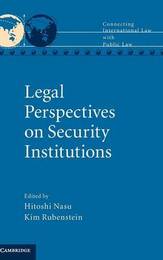
|
Legal Perspectives on Security Institutions
Hardback
Main Details
| Title |
Legal Perspectives on Security Institutions
|
| Authors and Contributors |
Edited by Hitoshi Nasu
|
|
Edited by Kim Rubenstein
|
| Series | Connecting International Law with Public Law |
|---|
| Physical Properties |
| Format:Hardback | | Pages:438 | | Dimensions(mm): Height 234,Width 157 |
|
| ISBN/Barcode |
9781107102781
|
| Classifications | Dewey:341.72 |
|---|
| Audience | | Professional & Vocational | |
|---|
| Illustrations |
1 Line drawings, black and white
|
|
Publishing Details |
| Publisher |
Cambridge University Press
|
| Imprint |
Cambridge University Press
|
| Publication Date |
24 July 2015 |
| Publication Country |
United Kingdom
|
Description
Due to the continuing expansion of the notion of security, various national, regional and international institutions now find themselves addressing contemporary security issues. While institutions may evolve by adjusting themselves to new challenges, they can also fundamentally alter the intricate balance between security and current legal frameworks. This volume explores the tensions that occur when institutions address contemporary security threats, in both public and international law contexts. As part of the Connecting International with Public Law series, it provides important and valuable insights into the legal issues and perspectives which surround the institutional responses to contemporary security challenges. It is essential reading for scholars, practitioners and policy makers seeking to understand the legal significance of security institutions and the implications of their evolution on the rule of law and legitimacy.
Author Biography
Hitoshi Nasu is a Senior Lecturer at ANU College of Law, Australian National University, Canberra. His expertise lies in public international law, particularly international security law and international humanitarian law. Kim Rubenstein is Professor and Director of the Centre for International and Public Law at ANU College of Law, Australian National University, Canberra. Her work spans constitutional, administrative and citizenship law.
|